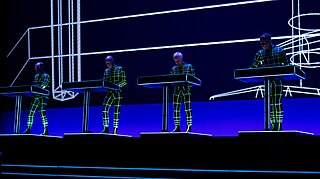
Kraftwerk are a German electronic band formed in Düsseldorf in 1970 by Ralf Hütter and Florian Schneider. Widely considered innovators and pioneers of electronic music, Kraftwerk were among the first successful acts to popularize the genre. The group began as part of West Germany's experimental krautrock scene in the early 1970s before fully embracing electronic instrumentation, including synthesizers, drum machines, and vocoders. Wolfgang Flür joined the band in 1973 and Karl Bartos in 1975, expanding the band to a quartet.
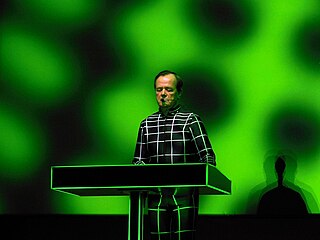
Ralf Hütter is a German musician and composer best known as the lead singer and keyboardist of Kraftwerk, which he founded with Florian Schneider in 1970. On 12 May 2021, Kraftwerk was announced as one of the inductees of the Rock and Roll Hall of Fame.

Autobahn is the fourth studio album by German electronic music band Kraftwerk, released in November 1974 by Philips Records. The album marked several personnel changes in the band, which was initially a duo consisting of Florian Schneider and Ralf Hütter; later, the group added Klaus Röder on guitar and flute, and Wolfgang Flür on percussion. The album also completed the group's transition from the experimental krautrock style of their earlier work to an electronic pop sound consisting mostly of synthesizers and drum machines. Recording started at the group's own Kling Klang facility, but was predominantly made at Conny Plank's studio. Autobahn also includes lyrics and a new look for the group that was suggested by Emil Schult, an associate of Schneider and Hütter.

Trans-Europe Express is the sixth studio album by German band Kraftwerk. Recorded in 1976 in Düsseldorf, Germany, the album was released in March 1977 on Kling Klang Records. It saw the group refine their melodic electronic style, with a focus on sequenced rhythms, minimalism, and occasionally manipulated vocals. The themes include celebrations of the titular European railway service and Europe as a whole, and meditations on the disparities between reality and appearance.

Tour de France Soundtracks is the eleventh and final studio album by German electronic music band Kraftwerk. It was first released on 4 August 2003, through Kling Klang and EMI in Europe and Astralwerks in North America. The album was recorded for the 100th anniversary of the first Tour de France bicycle race, although it missed its intended release date for the actual tour. It includes a new recording of their 1983 song of the same name, the cover artwork of both releases being nearly identical. The announcement of the release caused much anticipation, as it had been 17 years since the group had put out a full album of new studio material. It is also the last studio album to feature Florian Schneider before his departure from the band in 2008 and his death on 21 April 2020.
Organisation zur Verwirklichung gemeinsamer Musikkonzepte was an experimental krautrock band, that was the immediate predecessor of the band Kraftwerk. In addition to the founding members of Kraftwerk, Ralf Hütter and Florian Schneider-Esleben, Organisation included Basil Hammoudi, Butch Hauf, and Fred Monicks. The band was assisted by Paul Lorenz, Peter Martini, and Charly Weiss during their career.

Radio-Activity is the fifth studio album by German electronic music band Kraftwerk, released in November 1975. The band's first entirely electronic album is also a concept album organized around the themes of radioactive decay and radio communication. All releases of the album were bilingual, with lyrics in both English and German. The album was accompanied by single release of the title track, which was successful in France and Belgium.

The Man-Machine is the seventh studio album by German electronic music band Kraftwerk. It was released on 28 April 1978 by Kling Klang in Germany and by Capitol Records elsewhere. A further refinement of their mechanical style, the album saw the group incorporate more danceable rhythms. The album has a satirical bent to it. It is thought to address a wide-range of themes from the Cold War, Germany's fascination with manufacturing, and humankind's increasingly symbiotic relationship with machines. It includes the singles "The Model" and "The Robots".
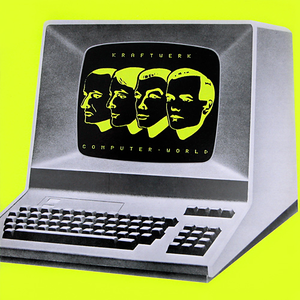
Computer World is the eighth studio album by German electronic band Kraftwerk, released on 11 May 1981. It was accompanied by four singles, including a double A-side UK no. 1 featuring "Computer Love".
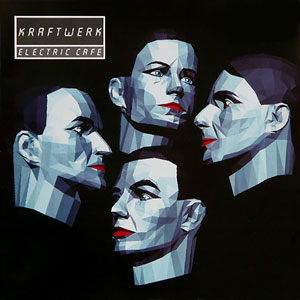
Electric Café is the ninth studio album by German electronic band Kraftwerk, released on 27 October 1986. The initial 1986 release came in versions sung in English and German, as well as a limited Edición Española release, featuring versions of "Techno Pop" and "Sex Object" with only Spanish lyrics. It was the first Kraftwerk LP to be created using predominantly digital musical instruments, although the finished product was still recorded onto analog master tapes.

The Mix is the tenth studio album by the German electronic music band Kraftwerk. It was released on 10 June 1991 by Kling Klang and EMI in Europe and by Elektra Records in North America. It features entirely re-arranged and re-recorded versions of a selection of songs which had originally appeared on Kraftwerk's albums Autobahn (1974) through Electric Café (1986). Some of the songs, such as "The Robots" and "Radioactivity", feature new additional melodies and/or lyrics.
Emil Schult is a German painter, poet and audio-visual artist.

Wolfgang Flür is a German musician, best known for playing percussion in the electronic group Kraftwerk from 1973 to 1987. Flür claims that he invented the electric drums the group used throughout the 1970s. However, patent records dispute this, citing Florian Schneider and Ralf Hütter as the creators.
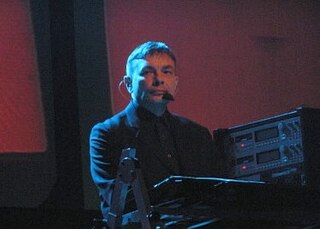
Karl Bartos is a German musician and composer known for his contributions to the electronic band Kraftwerk.
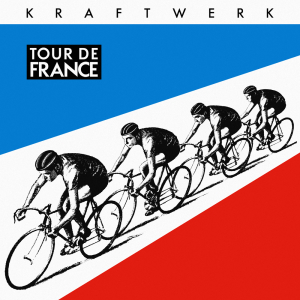
"Tour de France" is a song by German electronic band Kraftwerk. It was first issued in July 1983, peaking at number 22 in the United Kingdom singles chart on 21 August.
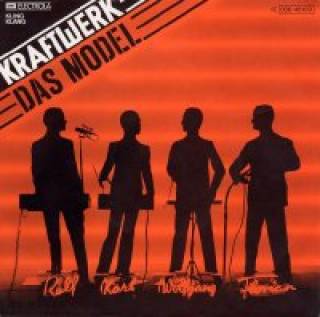
"Das Model" is a song recorded by the German group Kraftwerk in 1978, written by musicians Ralf Hütter and Karl Bartos, with artist Emil Schult collaborating on the lyrics. It is featured on the album, Die Mensch-Maschine.

"Radioactivity" is a song by the German electronic music band Kraftwerk. It was released in February 1976 as the only single from their fifth studio album, Radio-Activity (1975).
"Metal on Metal" is an instrumental by Kraftwerk from their 1977 album Trans-Europe Express. This track, combined with "Abzug", the track immediately succeeding it, forms an extended coda to "Trans-Europe Express".

"Musique Non Stop" is a 1986 single by German techno group Kraftwerk, which was featured on the album Electric Café. It was re-released as a remix on their 1991 album The Mix. The single was their first number one on Billboard Hot Dance Club Play and was one of two songs to make it to number one there.

Radioland: Radio-Activity Revisited is a studio album by English improvising pianist and synthesiser player Matthew Bourne (musician) and French electronic composer Franck Vigroux, created to mark the 40th anniversary of Kraftwerk's seminal album Radio-Activity. It was released digitally by The Leaf Label on 4 December 2015, with physical copies following in early 2016.

















